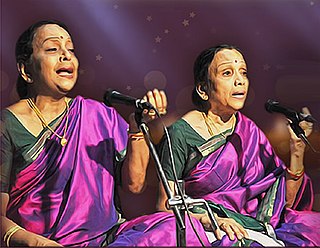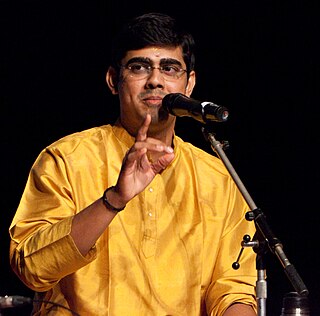
Madurai Shanmukhavadivu Subbulakshmi was an Indian Carnatic singer. She was the first musician ever to be awarded the Bharat Ratna - India's highest civilian honour, the first Indian musician to receive the Ramon Magsaysay award in 1974 and the first Indian to perform at the United Nations General Assembly in 1966.

Semmangudi Radhakrishna Srinivasa Iyer was an Indian Carnatic vocalist. He was the youngest recipient of the Sangeetha Kalanidhi awarded by the Music Academy in 1947, a distinction he holds to this day as of 2023, probably the only musician to receive that honour before reaching 40. He had received many other awards as well, including Padma Bhushan and Padma Vibhushan from the Government of India, Rajyasevanirata title from Travancore's erstwhile ruling family, Sangeet Natak Academy award (1953), Isai Perarignar from Government of Tamil Nadu and Kalidas Samman from Government of Madhya Pradesh. He was affectionately addressed as "Semmangudi Maama" by his disciples. He was also considered the "Pitamaha" or the grand sire of modern Carnatic Music. He was conferred with an honorary doctorate by University of Kerala in 1979.

Lalgudi Gopala Jayaraman was an Indian Carnatic violinist, vocalist and composer. He is commonly grouped with M.S. Gopalakrishnan and T.N.Krishnan as part of the violin trinity of Carnatic music. He was awarded the Padma Bhushan by the Government of India in 2001.

Natesan Ramani, commonly known as N. Ramani or N. Flute Ramani, was an Indian Carnatic flautist. He was awarded the Madras Music Academy's Sangeetha Kalanidhi in 1996. Ramani is also credited with introducing the long flute into Carnatic music.
Sikkil Kunjumani and Sikkil Neela were sisters who played the carnatic flute, called Venu flute. Together they are more famously known as the Sikkil Sisters. Their father Azhiyur Natesa Iyer was a mridangist. Kunjumani started learning music from her father initially and then learnt flute from her maternal uncle Azhiyur Narayanaswami Iyer. Neela learnt flute from her sister Kunjamani. Kunjamani, began giving concerts from the age of nine and Neela from the age of seven. Sikkil Sisters have been giving concerts together since 1962. They are top artistes of the All India Radio and they have been giving hundreds of performances at all the sabhas, television and elsewhere, both within India and abroad. The sisters blend the tone and play on their flutes and the merger is total and the effect remarkable. They are known for the chaste, orthodox style in rendering raga, kriti and swara.
Paapanaasam Raamayya Sivan was an Indian composer of Carnatic music and a singer. He was awarded the Madras Music Academy's Sangeetha Kalanidhi in 1971. He was also a film score composer in Kannada cinema as well as Tamil cinema in the 1930s and 1940s.
Chingleput Ranganathan was a classical Carnatic vocalist and Guru.

Vishakha Hari is a madhwa Carnatic music vocalist and proponent of Harikatha, a form of Hindu storytelling. She is a Madhwa mentor dedicated to instilling art and creativity within the education of children, who she believes are the torchbearer of culture.

The Bombay Sisters, C. Saroja and C. Lalitha (26 August 1938 – 31 January 2023), were an Indian Carnatic music singing duo. They received the Padma Shri, India's fourth highest civilian honour, in 2020.

Thanu Krishna Murthy, better known as T. K. Murthy, is an Indian mridangam player. Murthy is a Padma Shri and Sangeetha Kalanidhi awardee.

Mohanan Chandrasekaran is a Carnatic classical violinist from Chennai, Tamil Nadu, India. He was born in Calcutta, on 11 December 1937 as the younger of the two sons of T.N. Mohanan and Charubala Mohanan, a violinist herself. He was awarded the Madras Music Academy's Sangeetha Kalanidhi in 2005. Chandrasekharan began playing the violin at the age of 11, after which he went on to accompany many musicians in the field of Carnatic music. Having lost his eyesight at the age of two, he overcame his difficulty by music. He is also considered an expert in the laya (tempo) aspects, recognizing and adapting to intricate rhythmic patterns. Sri Chandrasekharan also presents vocal concerts, and sometimes sings along during his solo violin recitals. He has composed various musical forms in different languages, and has travelled the world performing. He often performs violin duet concerts with his daughter Smt. G. Bharathi. He has accompanied several masters of Carnatic music including Maharajapuram Santhanam, G. N. Balasubramaniam, Madurai Mani Iyer, Dr. K J Yesudas, Maharajapuram Viswanatha Iyer, flute N. Ramani, K. V. Narayanaswamy, T. N. Seshagopalan, D. K. Jayaraman, and T. K. GovindaRao.

Sikkil C. Gurucharan is among the foremost young performing musicians of Carnatic music in India today. He is the grandson of Sikkil Kunjumani, elder of the internationally acclaimed flautists the Sikkil Sisters. Gurucharan has been under the tutelage Vaigal Shri S. Gnanaskandan and is currently being mentored by Shri B. Krishnamurthy. He is an 'A' grade All India Radio artist. The magazine India Today featured him among 35 Game Changers Under 35 in India, a list of young achievers from different walks of life.

Vellore G. Ramabhadran was a Mridangam artiste from Tamil Nadu, India. He was awarded the Madras Music Academy's Sangeetha Kalanidhi in 2004.
Balasubramaniam Rajam Iyer was a Carnatic singer from South India. He was awarded the Madras Music Academy's Sangeetha Kalanidhi in 1987.

K. P. Parameswaran (Tamil: கே.பி.பரமேஸ்வரன்) is a professional mridangam artiste .He is a prime disciple of Sangeetha Kalanidhi Dr.T.K.Murthy. He has performed all over India and abroad with various stalwarts of Carnatic Music. He is a torch bearer of the Thanjavur style of mridangam playing.
N J Nandini is a Carnatic music vocalist from Trivandrum. Nandini was awarded the Chembai Puraskaram, the Isai Chudar title and a M S Subbalakshmi fellowship at the young age of 23. Nandini, who comes from a family that has a musical lineage, has been nurtured by gurus such as Prof Parassala Ponnammal, Prof P R Kumarakerala Varma, Dr S Bhagyalakshmi and Dr M N Moorthy.
Lalgudi Rajalakshmi is a violinist in the Indian classical Carnatic style of music. She performs the violin in the Lalgudi tradition.

Neela Ramgopal was an Indian Carnatic vocalist and Carnatic music teacher. Some of her works included Tamizh Inbam, Rama Upasana and Narayana Enniro. She was a recipient of awards, including the Sangeet Natak Akademi Award, the Sangita Kala Acharya Award by Madras Music Academy, and the Sangeetha Chudamani award from the Rama Seva Mandali.

Sukanya Ramgopal is an Indian carnatic musician from Tamil Nadu. She is best known as the first woman ghatam player in Carnatic music. She is also proficient in carnatic vocal, violin, mridangam and veena. She received several awards including Sangeet Natak Akademi Award, Karnataka Sangeeta Nritya Academy Award and awards from Madras Music Academy, Chennai.

Madhu Iyer is an Indian playback singer. She has recorded songs for films and albums in various Indian languages and has established herself as a known playback singer of South Indian cinema. Madhu aspired to become a playback singer from an early age. At the age of four, she started performing on stages. Apart from playback singing, Madhu performs in musical concerts around the world. She also appears in music videos. She produces her own music videos and teaches Carnatic music.














